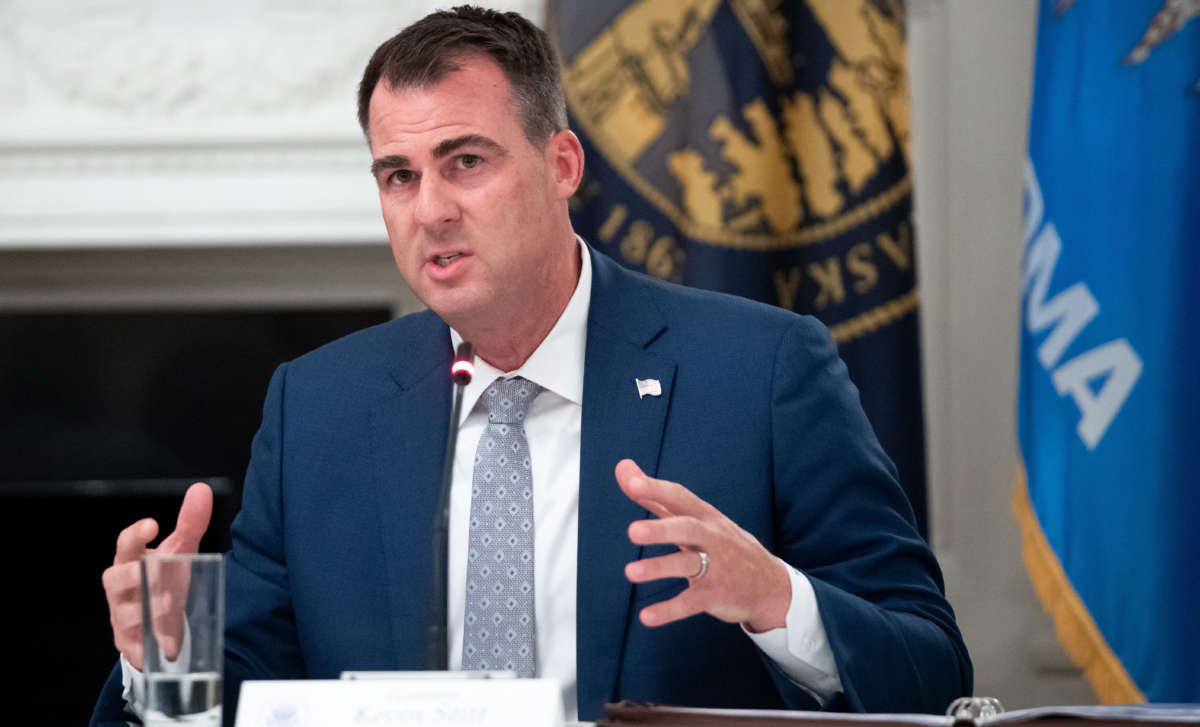Did you know that Truthout is a nonprofit and independently funded by readers like you? If you value what we do, please support our work with a donation.
Oklahoma Gov. Kevin Stitt signed a bill into law on Friday barring grade schools from teaching lessons about race or sex that may make students uncomfortable.
Schools in the state can no longer teach lessons about race that may cause “discomfort, guilt, anguish or any other form of psychological distress” to students. The bills passed the House and the Senate by wide margins. Both chambers are overwhelmingly controlled by Republicans, none of whom voted against the bill.
HB 1775 also bars educators from teaching students that “one race or sex is inherently superior to another race or sex” and the Republicans sponsoring the bill claim that they’re concerned about the teaching of critical race theory — though the implicit claim that educators were teaching either of the aforementioned concepts is dubious at best.
Critical race theory does not teach that any races are superior to others; rather, it simply holds that racism is deeply rooted in the country and is encoded in laws today, which the U.S. education system already largely fails to teach anyway. In trying to remove education on systemic racism in the country, Republicans have further embedded systemic racism into law, thus proving the point put forth by critical race theory.
“It’s a law that protects white students from white fragility by banning any subject that forces them to think critically about American racism past, present or future,” wrote Zack Linly for The Root. “This isn’t about education, it’s about racism…. Banning [critical race theory] does just as much to further the divide as teaching it apparently does. Black feelings are being disregarded while white feelings are being catered to.”
Many advocates and educators were appalled at the passage of the bill.
The 1921 Tulsa Race Massacre Centennial Commission wrote, “We are extremely disappointed that Oklahoma Legislators, including Governor Stitt, chose to support HB1775 which diametrically opposes the work of the 1921 Tulsa Race Massacre Centennial Commission.” The group was created with the aim of educating people about the white mob that killed hundreds in a predominantly Black neighborhood in Tulsa 100 years ago. Stitt is a commissioner in the group.
“The intention of the bill clearly aims to limit teaching the racial implications of America’s history. The bill serves no purpose than to fuel the racism and denial that afflicts our communities and our nation,” writes the commission. “It is a sad day and a stain on Oklahoma.” The Black Wall Street Times has called on Stitt’s removal from the commission in light of his signing of the bill.
Education officials in the state have also spoken out against the bill. Paula Lewis, the chairwoman of the Oklahoma City School Board, called HB 1775 “an outright racist and oppressive piece of legislation” on Twitter.
“I am appalled at the flagrant attempt to erase factual, incomprehensible history that has occurred in the United States,” Lewis wrote in a Twitter thread. “Our history as a country and as a state, if told accurately, is uncomfortable and should be heartbreaking for Americans that look like me, white.”
As with attacks on protesting, voting and trans people, Republicans in state legislatures have launched initiatives in half a dozen states to try and ban the teaching of critical race theory or their approximation of the subject, which is often flawed or outright wrong. The use of the term “critical race theory” is likely a distraction from their true aim of keeping white supremacy front and center in all curricula.
“The term critical race theory is being used by Republicans in a loose way to capture all sorts of critical thought about the histories and legacies of racism in this country,” Amna Akbar, an associate law professor at Ohio State University, told The Hill. “It’s a bogeyman that they’re constructing around critical attention to the history of the country.”
Trump is silencing political dissent. We appeal for your support.
Progressive nonprofits are the latest target caught in Trump’s crosshairs. With the aim of eliminating political opposition, Trump and his sycophants are working to curb government funding, constrain private foundations, and even cut tax-exempt status from organizations he dislikes.
We’re concerned, because Truthout is not immune to such bad-faith attacks.
We can only resist Trump’s attacks by cultivating a strong base of support. The right-wing mediasphere is funded comfortably by billionaire owners and venture capitalist philanthropists. At Truthout, we have you.
We’re in the midst of a fundraiser, and as of right now, we have until midnight to raise $13,000. Please take a meaningful action in the fight against authoritarianism: make a one-time or monthly donation to Truthout. If you have the means, please dig deep.
